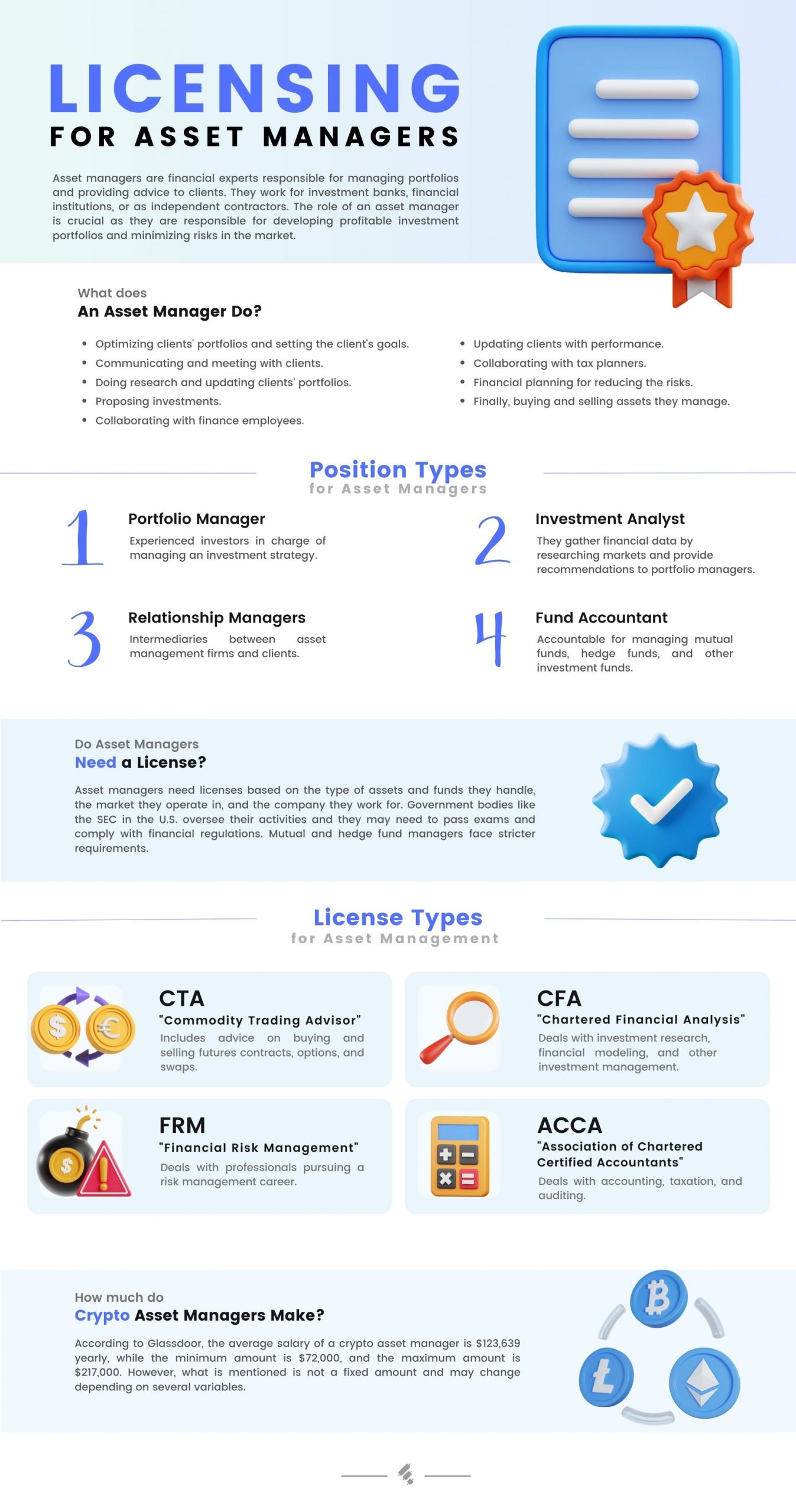Throughout history, there have been individuals who have accumulated more wealth than they require and have sought the assistance of trustworthy individuals to manage their finances. Over time, this developed into a profession known as asset management. Asset managers are financial experts responsible for managing portfolios and providing advice to clients. They work for investment banks, financial institutions, or as independent contractors. The role of an asset manager is crucial as they are responsible for developing profitable investment portfolios and minimizing risks in the market.
We have discussed the roles and different types of asset management in detail in the previous posts on Finestel. However, this post will highlight the licensing issues and the rules and regulations an asset manager deals with. Hence, we will briefly elaborate on do asset managers need a license and dive into more personal aspects of an asset manager, like salary, daily life, and job requirements.
What Does an Asset Manager Do?
Asset managers have an important role in the financial industry, and their role varies depending on the asset type/class they manage. Generally speaking, some roles and obligations are the same for all asset managers, ignoring the type of asset they manage. Here we have listed some unique responsibilities and roles served by asset managers.

- Optimizing clients’ portfolios and setting the client’s goals.
- Communicating and meeting with clients.
- Doing research and updating clients’ portfolios.
- Proposing investments.
- Collaborating with finance employees.
- Updating clients with performance.
- Collaborating with tax planners.
- Financial planning for reducing the risks.
- Finally, buying and selling assets they manage.
Find out the best crypto tax software in 2024.
Types of Asset Manager Positions
Asset management is a prestigious and demanding job that professional traders seek to achieve qualifications. The role requires individuals to have background knowledge, talent, and in some cases academic qualifications. The positions offered to asset managers have a hierarchical structure, including front, middle, and back office. Here we have listed some of these positions.
- Portfolio Manager: Experienced investors in charge of the overall management of an investment strategy.
- Investment Analyst: They gather financial data by researching different markets and provide recommendations to portfolio managers.
- Relationship Managers: They are intermediaries between asset management firms and clients.
- Fund Accountants: They are accountable for managing mutual funds, hedge funds, and other investment funds.
Read our Comprehensive guide on the best crypto portfolio trackers in 2024.
What Is Needed to Be an Asset Manager?
Unlike many other professions, asset managers cannot master this field by watching merely a YouTube channel. However, asset management requires both knowledge and experience, and experience outweighs education. Going further, to be an asset manager is multifaceted, and one-dimensional people cannot enter this profession.
![]()
First, asset managers must have the industry knowledge to inspect trends together with the most recent economic developments and regulatory changes. The next thing asset managers may require is licensing; depending on the jurisdiction, they will be asked for regulations. Finally, multitasking skill is a crucial skill since the asset manager must be able to handle multiple stakeholders and tasks at the same time.
Can Anyone Be an Asset Manager?
While it is naive that anyone can be an asset manager, individuals who obtain certain skills can become asset managers. These skills include academic degrees, experience in financial markets, and out-of-the-box thinking to name a few. Furthermore, asset managers should have communication skills like negotiation and organization. Therefore, to be an asset manager, individuals must have many skills and pass a bunch of requirements.
However, according to Indeed (the #1 job site in the world), the asset manager job is growing faster than average for all occupations. Therefore, it is wise to say that notwithstanding the qualifications, this profession is growing rapidly. Although the asset manager position is growing, the tasks and requirements to be an asset manager are numerous, and not anyone can pass them.
Do Asset Managers Need a License?
Licensing for asset managers mainly varies depending on the assets they manage, the market, and the funds they manage, and the company they work at. However, there are governmental bodies that verify the activities. For instance, in the U.S., the actions of asset managers are verified by SEC. The SEC mainly verifies the activities related to the management of securities, bonds, and stocks.
Additionally, these asset managers may be asked to pass Series 7 and 65 exams. Going further, asset managers may be asked to engage in some financial regulations like Anti-money laundering and KYC. Nevertheless, the story is different for those who manage mutual funds and hedge funds; in most cases, regulation and licensing are more expected of these individuals.
Types of Asset Management Licenses
We have concluded that asset management licenses may be obligatory for some and optional for other asset managers. However, for those who want to pursue and get a license, there are several types depending on the asset they manage and other factors. Therefore, we have tried to address the main license types and mention a few of them.
- CTA: It stands for “commodity trading advisor”, and it includes advice on buying and selling futures contracts, options, and swaps.
- CFA: It stands for “chartered financial analysis”, and it deals with investment research, financial modeling, and investment management.
- FRM: It stands for “financial risk management” and for those professionals pursuing a risk management career.
- ACCA: It stands for “Association of Chartered Certified Accountants”, and it deals with accounting, taxation, and auditing.
How Do I Obtain an Asset Management License?
Obtaining an asset management license depends on the field that the asset manager seeks to pursue. However, here we provided a list that meets the general criteria for those who want to enter this field.
- Identify regulatory frameworks and review the relevant laws.
- Research the specific license type you are seeking to attain.
- Evaluate if you meet the requested requirements.
- Review the judiciary applications.
- If applicable, prepare for the examinations.
- Familiarize yourself with reporting and compliance procedures.
What was mentioned was an overview of procedures that are mostly the same in all jurisdictions and are subject to change.
Do Asset Managers Need CFA?
Speaking of certificates and experience, there is no better word than what John Dewey said: “All genuine education comes about through experience .” Therefore, having chartered qualifications is a privilege, not an obligation, in most cases other than what organizations will ask due to legislation mandated by governments.

On the other hand, having a CFA license is a bonanza since getting this license is absolutely difficult and requires both time and experience. Additionally, CFA is an industry-recognized license worldwide, and having this license for individuals involves credibility. Overall, having a CFA license is optional in most cases. However, the individuals who pursue this certification seek credibility and knowledge.
CFA vs. ACCA, What Are the Key Differences?
The initiative to address the key differences between CFA and ACCA is to address their role and function. So we have tried to minimize the scope and inspect the differences in more detail.
Core Functions
- CFA serves as financial analysis and investment management.
- ACCA is mostly related to financial and investment accounting.
Organizing Body
- CFA is governed by the CFA Institute in the USA.
- ACCA is governed by the Association of Chartered Certified Accountants (ACCA), UK.
Examination Requirements
- In CFA, three sequential levels must be cleared: Level I, II, and III.
- In ACCA, the participants must clear three levels of Applied Knowledge, Applied Skills, and Strategic professionals.
Job Positions
- The CFA professionals will be strategic analysts, wealth managers, and portfolio managers.
- The ACCA professionals will be accountants, internal auditors, and financial consultants.
How Do Asset Managers Get Paid?
Asset managers’ basic criteria for getting paid are management and performance fees. Still, many factors affect this criterion, like the type of asset, the investment amount, and the asset management firm. Nevertheless, we have tried to mention some common ways asset managers get paid. First, the most common criteria are asset management fees, based on a percentage of the client’s invested assets.

The following common way is through performance fee; the asset manager typically gets 10 to 20 percent of profits achieved. Finally, another revenue stream for asset managers is consultancy or advisory fees, including financial and customized investment planning.
How Much Do Crypto Asset Managers Make?
According to Glassdoor, the average salary of a crypto asset manager is $123,639 yearly, while the minimum amount is $72,000, and the maximum amount is $217,000. However, what is mentioned is not a fixed amount and may change depending on several variables. First, depending on the funds that the asset manager handles, the income will change based on the performance fee. For instance, if the asset manager is handling $3 million, then by applying a %10 performance fee, they will make a fortune of $300,000 yearly. Also, being an expert in blockchain and having relevant certifications is an advantage and will increase the compensation for payments.
A Day in the Life of an Asset Manager
Asset managers put in long hours to make investments daily and often work weekends too. The routine for asset managers varies, and each asset manager may have a personal agenda. However, we have tried to mention the items they will probably accomplish rather than the timing.
- After waking up, they usually research asset classes.
- They start analyzing pre-market movements at around 8 a.m.
- Communicate with clients and engage in meetings.
- Manage portfolios and check real-time movements, even if away from the office.
- Monitor market news throughout the day.
- At the end of the day, asset managers review the firm’s portfolios for news and subscriptions.
Asset Managers Licensing Infographic
Conclusion
In conclusion, asset managers take care of clients’ investments by using numerous strategies and taking technical measures. Also, asset management is an encompassing term that covers portfolio managers, investment analysts, and relationship managers. Besides, we have reviewed the prerequisites to be an asset manager, and the road individuals must take to be asset managers. Going further, we answered the question, do asset managers need a license? And we have concluded that having a license is a bonanza for traders, not an obligation in most cases. Moreover, we put forward different license types that an asset manager can get, like CFA, ACCA, and FRM.
Generally speaking, entering asset management bears some risks since the individual’s funds depend on the manager’s performance. On the other hand, the benefits can also convince you to resume your position, where a qualified and experienced asset manager can make a $1.5 million yearly fortune. If you ask yourself how? Read numerous researches on the subject and prepare an action plan to achieve it.
FAQ
What is an asset management license?
Asset management license refers to a license authorized by a legal entity that grants an individual or a company the right to do business by managing investment assets on behalf of clients.
What are the consequences of operating without an asset management license?
The consequences of operating without a license may not apply to all. However, there may be some repercussions depending on where you live and the type of asset you manage. Some consequences include legal penalties, credibility damage, restricted business opportunities, and restricted access to specific markets.
What is the highest asset manager salary?
There are several factors to pinpoint the exact amount, like experience, certification, location, bonuses, and partnerships, to name a few. However, per the research done by Glassdoor, the highest asset manager salary is $217,000.
What is the salary of an asset manager at JP Morgan?
The asset manager’s salary at JP Morgan depends on the size of the fund, types of investment vehicles, and investment style. However, per the research and reviews by former employees, the average yearly salary at JP Morgan is $94,527, and the maximum salary is $172,000.






Leave a Reply